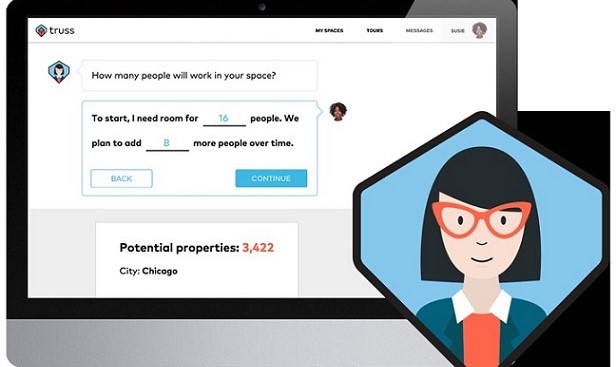
CHICAGO—Last month, GlobeSt.com reported the launching of Truss, a new Chicago-based start-up that aims to help smaller tenants efficiently find spaces that fit their needs. Its new platform already has complete information on more than 80% of Chicago's spaces, and users can also get 3D virtual tours on properties they find interesting. GlobeSt.com spoke with Bobby Goodman, Truss co-founder, to get a broader overview of how technology has already changed commercial real estate, the impact of the many recent mergers in the tech world, and the future impact of virtual reality and artificial intelligence.
Q: Why is CRE slow to adopt technology?
Like professionals in healthcare, retail or anything else, those in commercial real estate can get set in their ways. Commercial real estate is historically a relationship-based business with a focus on people and paper — posing a small hurdle to encourage tech adoption.
Also, the median age of all real estate professionals is 58 years old. These people are not the Facebook generation, and since they have been successful for several years without technology, they hesitate to adopt it. In their minds, why risk using a tech solution when they have already been successful without it?
Plus, so many tech tools out there today are too acute — they don't fulfill all needs of the user. Too many single point solutions become overwhelming, and brokers don't have the time to sort through each and every one.
Thankfully, today's solutions are more user-friendly and holistic than they've ever been, which should help ease people into making the switch. It's the tools that best meet the two major needs of brokers – saving time and making money – that will succeed.
Q: The end of 2016 saw some significant mergers in CRE tech. Will that trend continue?
I think it will continue. Again, there are a lot of similar tools out there that different people use. For example, there are several financial analytics tools available, and if everyone uses different ones and there is no consistency, then you will see these companies start to merge.
Q: What role will tenants have in the world of CRE tech?
We're seeing it now: tenants are already demanding more transparency and better quality data up front to help improve the process of leasing space. They don't want to bang their heads against the wall trying to get data. They want relevant information at the get-go so that they can handle the process more quickly and easily.
One of the challenges up until now is that property owners and brokerage companies have been very protective of their data. Simple information about properties such as the cost of a space has been kept from potential tenants early in the process. For example, one-third of spaces on listing providers don't list rent. But people haven't yet realized that withholding this information creates a bigger barrier and sucks up more time later. Tenants are left wasting time aggregating information, which prolongs the process. If companies would be more forthright about information, then they will waste less time later answering common questions such as how much rent costs.

Q: What is the role of virtual reality and artificial intelligence in CRE?
Virtual reality and artificial intelligence are emerging as instrumental technologies with the ability to increase efficiency in every industry they touch. Commercial real estate is no exception.
Virtual reality puts the property at that tenant's fingertips without having to leave the comfort of their own home. They can visit a property without having to physically go to the spot, allowing them to more easily filter down their list of options.
Artificial Intelligence will speed up processes. It will be able to predict what tenants want so they can cut through negotiations and get to the final deal more quickly. As it stands today, the negotiation process can take months, but with AI, you'll be able to cut right to the answer because there will be enough data to tell the landlord and tenant what the deal should be.
Q: With increased tech adoption in CRE, what role will humans have in the process? Will personal relationships still have a role in CRE?
Yes, personal relationships will still have a role in CRE. Each tenant has their own unique needs and demands that require one-on-one human conversations. While people will remain involved, the roles will change a little bit. Brokers will take on more of a consulting role than they have now. Since tenants will have more information at their fingertips, they will lean on brokers to provide expertise and counsel.
Q: Will there be increased use of tech in CRE in 2017? How come?
Yes. Every year, more people are adopting technology. Today's tools are getting smarter because industry professionals who understand the pain points are developing user-friendly products that will help people save time and make money. As long as the technology helps people achieve those two things, adoption will continue.
Q: How will property owners use technology to correctly price their spaces?
Right now, there is a lot of mispricing in the market, but pricing will become more accurate using AI and real-time data. Landlords will be able to look at recent transactions and understand how they can better price a space. Different features attract more people than others — a remodeled kitchen is more exciting to a tenant than a new mailroom. With the right technologies, landlords will be able to accurately price spaces and minimize the negotiation process.

CHICAGO—Last month, GlobeSt.com reported the launching of Truss, a new Chicago-based start-up that aims to help smaller tenants efficiently find spaces that fit their needs. Its new platform already has complete information on more than 80% of Chicago's spaces, and users can also get 3D virtual tours on properties they find interesting. GlobeSt.com spoke with Bobby Goodman, Truss co-founder, to get a broader overview of how technology has already changed commercial real estate, the impact of the many recent mergers in the tech world, and the future impact of virtual reality and artificial intelligence.
Q: Why is CRE slow to adopt technology?
Like professionals in healthcare, retail or anything else, those in commercial real estate can get set in their ways. Commercial real estate is historically a relationship-based business with a focus on people and paper — posing a small hurdle to encourage tech adoption.
Also, the median age of all real estate professionals is 58 years old. These people are not the Facebook generation, and since they have been successful for several years without technology, they hesitate to adopt it. In their minds, why risk using a tech solution when they have already been successful without it?
Plus, so many tech tools out there today are too acute — they don't fulfill all needs of the user. Too many single point solutions become overwhelming, and brokers don't have the time to sort through each and every one.
Thankfully, today's solutions are more user-friendly and holistic than they've ever been, which should help ease people into making the switch. It's the tools that best meet the two major needs of brokers – saving time and making money – that will succeed.
Q: The end of 2016 saw some significant mergers in CRE tech. Will that trend continue?
I think it will continue. Again, there are a lot of similar tools out there that different people use. For example, there are several financial analytics tools available, and if everyone uses different ones and there is no consistency, then you will see these companies start to merge.
Q: What role will tenants have in the world of CRE tech?
We're seeing it now: tenants are already demanding more transparency and better quality data up front to help improve the process of leasing space. They don't want to bang their heads against the wall trying to get data. They want relevant information at the get-go so that they can handle the process more quickly and easily.
One of the challenges up until now is that property owners and brokerage companies have been very protective of their data. Simple information about properties such as the cost of a space has been kept from potential tenants early in the process. For example, one-third of spaces on listing providers don't list rent. But people haven't yet realized that withholding this information creates a bigger barrier and sucks up more time later. Tenants are left wasting time aggregating information, which prolongs the process. If companies would be more forthright about information, then they will waste less time later answering common questions such as how much rent costs.

Q: What is the role of virtual reality and artificial intelligence in CRE?
Virtual reality and artificial intelligence are emerging as instrumental technologies with the ability to increase efficiency in every industry they touch. Commercial real estate is no exception.
Virtual reality puts the property at that tenant's fingertips without having to leave the comfort of their own home. They can visit a property without having to physically go to the spot, allowing them to more easily filter down their list of options.
Artificial Intelligence will speed up processes. It will be able to predict what tenants want so they can cut through negotiations and get to the final deal more quickly. As it stands today, the negotiation process can take months, but with AI, you'll be able to cut right to the answer because there will be enough data to tell the landlord and tenant what the deal should be.
Q: With increased tech adoption in CRE, what role will humans have in the process? Will personal relationships still have a role in CRE?
Yes, personal relationships will still have a role in CRE. Each tenant has their own unique needs and demands that require one-on-one human conversations. While people will remain involved, the roles will change a little bit. Brokers will take on more of a consulting role than they have now. Since tenants will have more information at their fingertips, they will lean on brokers to provide expertise and counsel.
Q: Will there be increased use of tech in CRE in 2017? How come?
Yes. Every year, more people are adopting technology. Today's tools are getting smarter because industry professionals who understand the pain points are developing user-friendly products that will help people save time and make money. As long as the technology helps people achieve those two things, adoption will continue.
Q: How will property owners use technology to correctly price their spaces?
Right now, there is a lot of mispricing in the market, but pricing will become more accurate using AI and real-time data. Landlords will be able to look at recent transactions and understand how they can better price a space. Different features attract more people than others — a remodeled kitchen is more exciting to a tenant than a new mailroom. With the right technologies, landlords will be able to accurately price spaces and minimize the negotiation process.
Want to continue reading?
Become a Free ALM Digital Reader.
Once you are an ALM Digital Member, you’ll receive:
- Breaking commercial real estate news and analysis, on-site and via our newsletters and custom alerts
- Educational webcasts, white papers, and ebooks from industry thought leaders
- Critical coverage of the property casualty insurance and financial advisory markets on our other ALM sites, PropertyCasualty360 and ThinkAdvisor
Already have an account? Sign In Now
*May exclude premium content© 2025 ALM Global, LLC, All Rights Reserved. Request academic re-use from www.copyright.com. All other uses, submit a request to [email protected]. For more information visit Asset & Logo Licensing.








